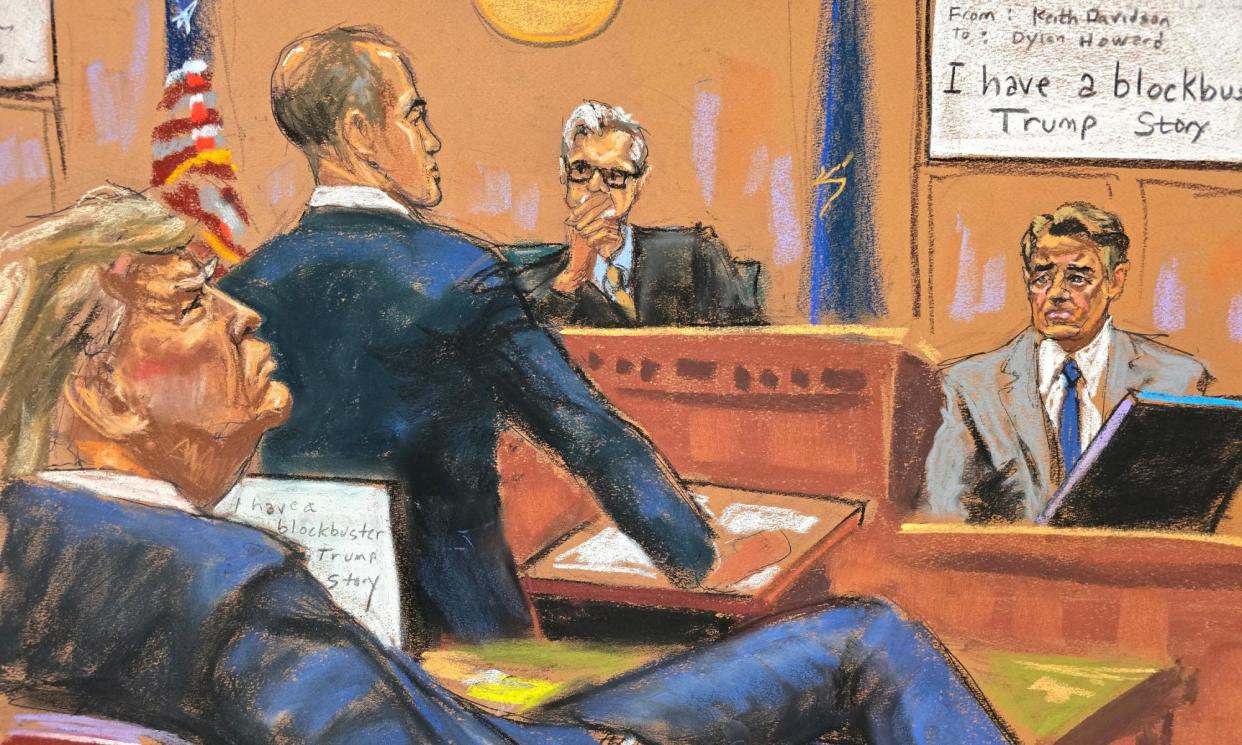Trump’s jury hears audio proof he knew about the McDougal catch-and-kill

On the docket: a rough day for prosecutors takes a turn at the end
Prosecutors faced their first rough day in court on Thursday – but a bit of tape might have just turned everything around for them.
Late in the afternoon, prosecutors played an audio recording of a phone conversation between Donald Trump and his attorney and fixer Michael Cohen openly discussing in September 2016 the plan to keep former Playboy model Karen McDougal from telling her story about her alleged affair with Trump.
“I need to open up a company for the transfer of all of that info regarding our friend David,” Cohen says on the September 2016 tape.
That tape has been out in the public since 2018, but it’s the first time the jury is hearing it. The David in question here seems to be National Enquirer boss David Pecker, who testified earlier in the trial that he bought McDougal’s silence after offering to help Trump’s campaign. And it makes clear that Trump knew about that plot – giving credence to the idea that he was involved in the scheme to keep adult film star Stormy Daniels quiet about her alleged affair with Trump as well.
The phone call, which Cohen had secretly recorded, was played after a chaotic day of testimony from Keith Davidson, the attorney who represented both McDougal and Daniels.
That part of the day didn’t go so great for prosecutors.
At one point, Davidson said he didn’t consider Daniels’ non-disclosure agreement “hush-money” but rather “consideration for a civil settlement”. That sounds a lot more like legitimate legal work, and undercuts prosecutors’ key argument that Trump broke the law by falsifying business expenses when he paid Cohen “legal expenses” to cover the payment transfer.
Trump’s attorneys, during cross-examination, got Davidson to admit he had never personally met Trump. They also did a lot to rough up his reputation and try to paint him as an extortion artist, getting Davidson to acknowledge that authorities had investigated him for extorting wrestler Hulk Hogan over a sex tape in Florida (Davidson was not charged) and highlighting his involvement in salacious cases involving Charlie Sheen and Tila Tequila.
At one point, Trump attorney Emil Bove asked Davidson if his job required “getting right up to the line without committing extortion”.
Davidson did back up his claim that Cohen had made clear to him, beforehand and afterwards, that he was paying off Daniels with Trump’s knowledge and at his request. Prosecutors played audio of a telephone call recorded in 2018 in which Cohen tells Davidson: “I can’t even tell you how many times he said to me, you know, I hate the fact that we did it,” which Davidson says he understood was a reference to Trump paying Daniels.
Davidson also explained his election-night text to National Enquirer editor Dylan Howard. After it became clear Trump had won, Davidson proclaimed: “What have we done?”
Davidson said that the text message, which had been included in the prosecution’s opening argument, was “gallows humor” about the fact that “our activities may have in some way assisted the presidential campaign of Donald Trump.”
You can read a full recap of the day here, and read more key takeaways here. Trial will resume on Friday morning.
Sidebar: More contempt questions
The day began with prosecutors requesting that Judge Juan Merchan hold Trump in contempt once again for four more violations of the gag order and fine him the maximum $1,000 per violation for each penalty. Prosecutors said they’re not currently asking for jail time to avoid delaying the proceedings. While Merchan didn’t seem likely to side with them on every example (he seemed willing to let Trump fire back at Cohen, who keeps attacking him online), Merchan made clear that he was unhappy that Trump had gone after the jury.
“He spoke about the jury, he said that the jury was 95% Democrat, and the jury was being rushed through. The implication that this is not a fair jury,” Merchan said.
Later in the day, before trial resumed after a lunch break, he refused a request from Trump attorney Susan Necheles to say whether or not a stack of news articles that Trump hoped to share on social media would violate the gag order.
Merchan wasn’t having it.
“I’m not going to be in the position of looking at posts and determining in advance whether he should and should not post these on Truth Social,” Merchan said. “I think the best advice you can give your client is when in doubt, steer clear.”

 Yahoo News
Yahoo News 
